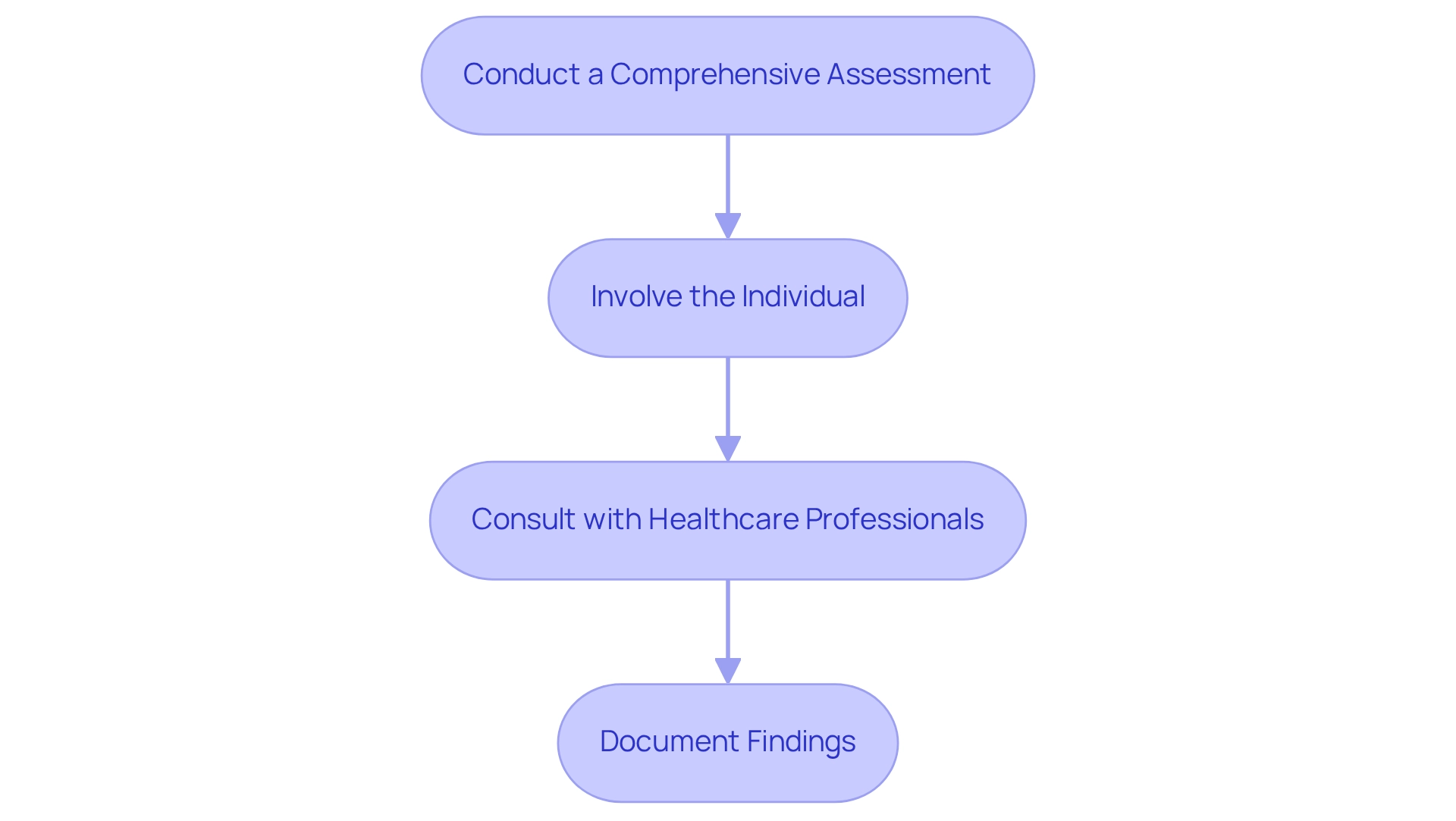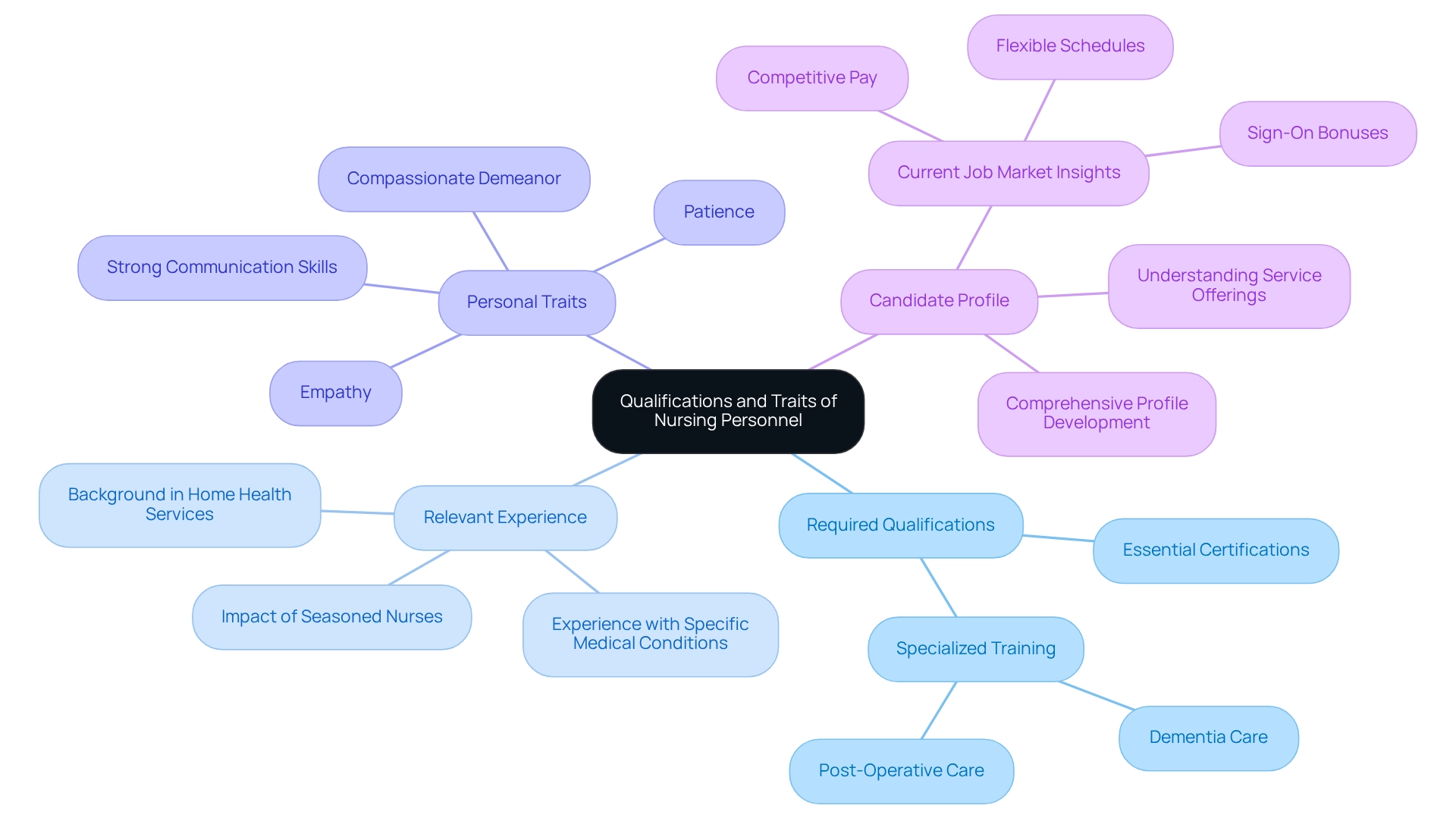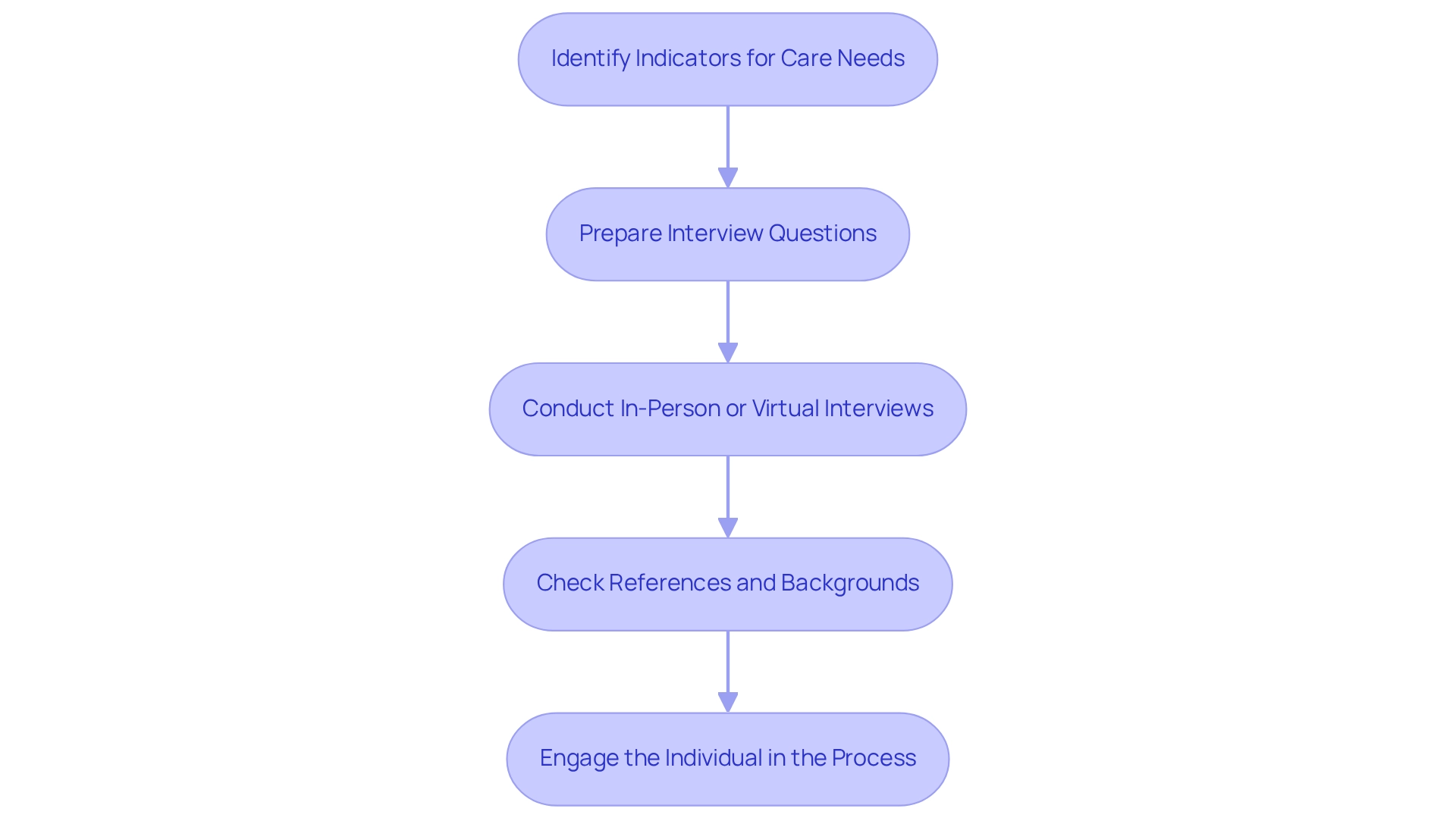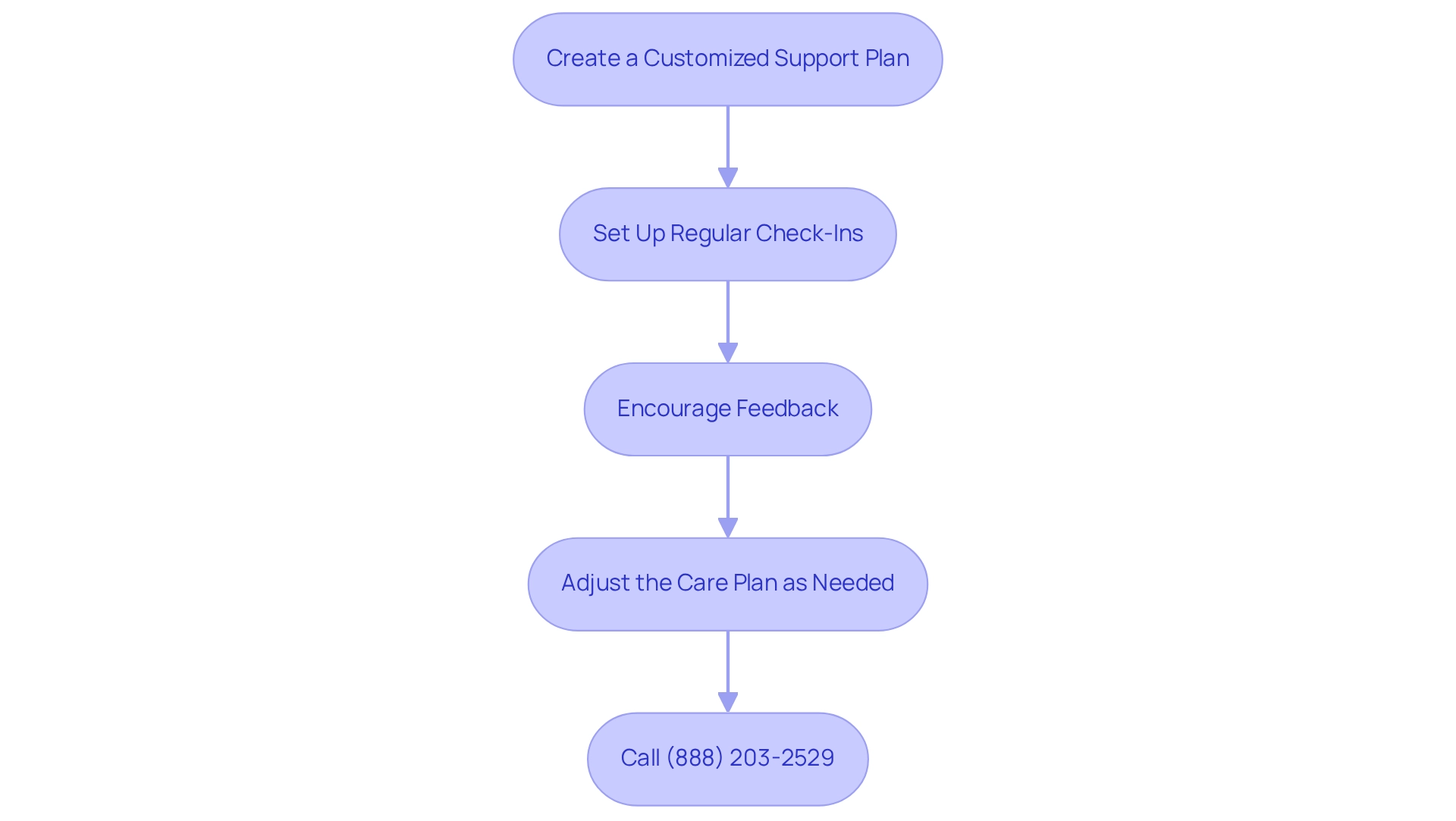Overview
Selecting the right nursing personnel for home care is a deeply personal decision, one that requires careful consideration of your loved one’s unique needs and preferences. It begins with a comprehensive assessment to truly understand what is required for their care. Identifying the necessary qualifications and traits in nursing staff is crucial. This process involves thorough interviewing and vetting, ensuring that the caregivers not only have the relevant experience but also possess the personal qualities that make them compassionate and attentive.
At the heart of this selection process is the importance of personalized evaluations. We recognize that each individual has distinct needs, and it’s essential that the chosen personnel can effectively meet those needs. Open communication throughout the care process is vital; it fosters trust and ensures that both you and the caregivers are aligned in providing the best support possible. Your comfort and peace of mind are our top priorities, and we are here to guide you every step of the way.
In addition, maintaining a nurturing environment is key to successful home care. By choosing caregivers who are not only qualified but also empathetic, you can feel confident that your loved one is in good hands. Remember, we’re here for you—together, we can find the right support that truly makes a difference in your loved one’s life.
Introduction
Navigating the complexities of home health care can feel overwhelming for families seeking the best support for their loved ones. As our aging population continues to grow, it becomes increasingly important to understand how to assess individual care needs and preferences. This understanding is crucial for ensuring quality assistance.
This article explores the essential steps for selecting the right nursing personnel. From conducting thorough assessments and identifying necessary qualifications to developing personalized care plans, each step is designed to empower families. By emphasizing the importance of open communication and tailored approaches, we can help you make informed decisions that enhance the well-being and comfort of your elderly relatives.
Remember, you are not alone in this journey. We’re here for you, ready to support you every step of the way.
Assess Individual Care Needs and Preferences
-
Conduct a Comprehensive Assessment: Start by evaluating the individual’s physical, emotional, and social needs. Think about important factors like medical conditions, mobility issues, and daily living activities. If they struggle with personal hygiene, dressing, cooking, cleaning, or managing medications, it may be time to consider CNA/HHA services. Using tools like checklists or questionnaires can help gather detailed information. Without these services, seniors might face risks such as health decline, poor nutrition, and social isolation.
-
Involve the Individual: Whenever possible, engage the person receiving support in discussions about their preferences. This includes their daily routines, favorite activities, and any specific requests they might have regarding their care. Open communication is essential to ensure their needs are met and that they feel comfortable with the support provided.
-
Consult with Healthcare Professionals: Talk to doctors, nurses, or social workers familiar with the individual’s health status. They can provide valuable insights into the level of assistance needed and any specialized services that may be essential. This step is vital, as chronic conditions can worsen without proper medical monitoring and support. Understanding the differences in training between CNAs, who focus on medical tasks, and HHAs, who prioritize personal assistance, can also inform your decision.
-
Document Findings: Create a comprehensive support profile outlining the person’s needs and preferences. This document will serve as a guide during the selection process, ensuring that the chosen nursing staff can effectively meet these requirements. Regularly connect with your loved one to discuss their experiences and any concerns, as this can help maintain quality support and address any issues promptly.

Identify Qualifications and Traits of Nursing Personnel
- Determine Required Qualifications: Begin by recognizing the essential certifications and licenses for nursing staff tailored to specific support needs. If proficient nursing services are vital, ensure candidates possess the necessary credentials, such as registered nurses (RNs) or licensed practical nurses (LPNs). As we look ahead to 2025, the qualifications for nursing personnel home care in health services underscore the importance of specialized training, particularly for conditions like dementia or post-operative care. At Best Care Nurses Registry, we ensure that our recommended nurses are not only qualified but also provide patient education and emotional support, making home health services a cost-effective and convenient alternative to hospital treatment.
- Look for Relevant Experience: It’s crucial to prioritize candidates who have a background in home health services or experience with specific medical conditions relevant to the individual’s needs. Research indicates that seasoned nurses significantly enhance service standards, offering not just medical assistance but also emotional comfort to patients and their families. Self-employed private duty nurses often enjoy greater autonomy in their professional lives, which can further elevate the quality of care they provide, easing family caregiving responsibilities. Our providers at Best Care Nurses Registry are trained to deliver personalized support, ensuring that each patient’s unique needs are met. Testimonials from families highlight the positive impact of our support staff, showcasing their dedication and expertise.
- Evaluate Personal Traits: It’s important to assess candidates for essential traits such as empathy, patience, and strong communication skills. These qualities are vital for building trust and rapport with clients, which can lead to improved care outcomes. Industry leaders emphasize that care providers should embody a compassionate demeanor and possess the ability to listen actively, ensuring clients feel valued and understood. Additionally, caregivers should be well-informed about the services they provide, as clarity in service offerings is essential for families to make informed choices. At Best Care Nurses Registry, we prioritize individualized support, selecting providers not only for their skills but also for their ability to connect with clients personally. Feedback from clients consistently praises our caregivers for their compassionate approach and effective communication.
- Create a Candidate Profile: Develop a comprehensive profile outlining the ideal qualifications and traits for nursing personnel. This profile should encompass both the required certifications and the personal qualities that enhance effective nursing personnel home care. For instance, Best Care Nurses Registry offers a detailed list of health services, assisting families in understanding the specific requirements associated with different support situations. By establishing a clear candidate profile, families can simplify the selection process and make informed decisions when evaluating potential nursing staff. Furthermore, recognizing the current job market, which includes competitive pay, flexible schedules, and sign-on bonuses, can help attract qualified candidates. Our unwavering commitment to quality service since 1980 reflects our dedication to meeting the evolving needs of our clients.

Conduct Interviews and Vetting Processes
-
Identify Indicators for Care Needs: Before conducting interviews, it’s important to assess the situation of your elderly relative. Look for signs that suggest they may need CNA or HHA services, such as difficulties with personal hygiene, dressing, cooking, cleaning, or managing medications. Health issues, like managing chronic conditions or frequent hospital stays, are also crucial indicators that ongoing support may be necessary.
-
Prepare Interview Questions: Consider developing a thoughtful list of questions that encompass both technical skills and personal qualities. Ask about their past experiences, how they handle challenging situations, and their approach to supporting patients. It’s also beneficial to include questions that gauge their understanding of seniors’ specific needs, such as managing chronic conditions or assisting with daily living activities.
-
Conduct In-Person or Virtual Interviews: Arrange interviews with the candidates you’ve shortlisted. Pay close attention to their communication style, demeanor, and responses to your questions. This interaction can provide valuable insights into their personality and compatibility with your loved one. It’s essential that they demonstrate a compassionate approach, as this is vital for effective nursing personnel home care.
-
Check References and Backgrounds: Always take the time to conduct reference checks to confirm the candidate’s work history and qualifications. Performing background checks is equally important to ensure there are no safety concerns. This step is crucial in guaranteeing that the provider possesses the necessary training and experience, especially in medical tasks. CNAs typically undergo more comprehensive training focused on medical duties, while nursing personnel home care primarily concentrates on personal support and daily living activities.
-
Engage the Individual in the Process: If appropriate, involve the person receiving support in the interview process. Their comfort and trust in the caregiver are paramount, and their input can be invaluable in making the final decision. Regular communication with the caregiver and the home support agency can help maintain quality assistance and address any concerns promptly.

Develop a Care Plan and Maintain Communication
- Create a Customized Support Plan: Collaborate with the nursing personnel home care at Best Care Nurses Registry to develop a support plan that outlines specific objectives, tasks, and schedules tailored to the individual’s needs and preferences. This personalized approach ensures that care is delivered appropriately. With our experienced attendants, you can find peace of mind knowing your loved one is secure and content at home.
- Set Up Regular Check-Ins: Establish a routine for consistent communication among family members, caregivers, and healthcare professionals. This might include weekly meetings or daily updates to discuss progress and any changes in the person’s condition. Our compassionate staff is here to support you every step of the way, providing emotional relief through regular communication.
- Encourage Feedback: Create an environment where the individual receiving assistance and their family feel comfortable sharing feedback about the support being delivered. This openness can help identify areas for improvement and ensure that the plan remains relevant. At Best Care Nurses Registry, we prioritize your loved one’s happiness and well-being, actively incorporating feedback into the care process.
- Adjust the Care Plan as Needed: Be ready to modify the care plan based on feedback and changes in the person’s health status. Regularly reviewing and updating the plan ensures it continues to meet the individual’s needs effectively. Our personalized caregiver matching service guarantees that you receive the right support tailored to your family’s unique situation.
Call to Action: Call (888) 203-2529 to speak with our friendly staff about creating a personalized care plan for your loved one.

Conclusion
Understanding the intricacies of home health care is essential for families seeking the best support for their elderly loved ones. This journey begins with a comprehensive assessment of individual care needs, considering physical, emotional, and social factors. Engaging in discussions about preferences and consulting healthcare professionals can provide invaluable insights, ensuring that the chosen nursing personnel are well-equipped to deliver quality care.
Identifying the right qualifications and personal traits of nursing staff is equally important. Families should prioritize candidates with the necessary certifications and relevant experience, while also valuing essential qualities such as empathy and strong communication skills. Crafting a detailed candidate profile can streamline the selection process, guiding families in their search for the ideal caregiver who can meet their loved one’s unique needs.
Conducting thorough interviews and background checks enhances the vetting process, ensuring that the selected nursing personnel not only possess the required skills but also fit well with the individual receiving care. Involving the individual in this process fosters trust and comfort, which are paramount for effective home health care.
Lastly, developing a personalized care plan and maintaining open lines of communication among caregivers, family members, and healthcare professionals is vital for ongoing support. Regular check-ins and feedback mechanisms allow for adjustments to the care plan as needed, ensuring that it remains relevant and effective. By following these steps, families can navigate the complexities of home health care with confidence. Remember, your comfort is our priority, and we’re here for you every step of the way.
Frequently Asked Questions
What is the first step in assessing the need for CNA/HHA services?
The first step is to conduct a comprehensive assessment of the individual’s physical, emotional, and social needs, considering factors such as medical conditions, mobility issues, and daily living activities.
How can I determine if a senior needs CNA/HHA services?
If the individual struggles with personal hygiene, dressing, cooking, cleaning, or managing medications, it may indicate the need for CNA/HHA services. Using checklists or questionnaires can help gather detailed information.
Why is it important to involve the individual in discussions about their care?
Involving the individual in discussions about their care ensures that their preferences are considered, including their daily routines and favorite activities, which helps them feel comfortable and supported.
Who should I consult to gain insights into the individual’s care needs?
You should consult healthcare professionals such as doctors, nurses, or social workers who are familiar with the individual’s health status, as they can provide valuable insights into the level of assistance needed.
What is the difference between CNAs and HHAs?
CNAs focus on medical tasks, while HHAs prioritize personal assistance. Understanding this distinction can help inform your decision regarding the type of support needed.
What should I do with the information gathered during the assessment?
You should document the findings in a comprehensive support profile that outlines the person’s needs and preferences, which will guide the selection process for nursing staff.
How can I ensure the quality of support provided?
Regularly connect with your loved one to discuss their experiences and any concerns, which can help maintain quality support and address any issues promptly.










